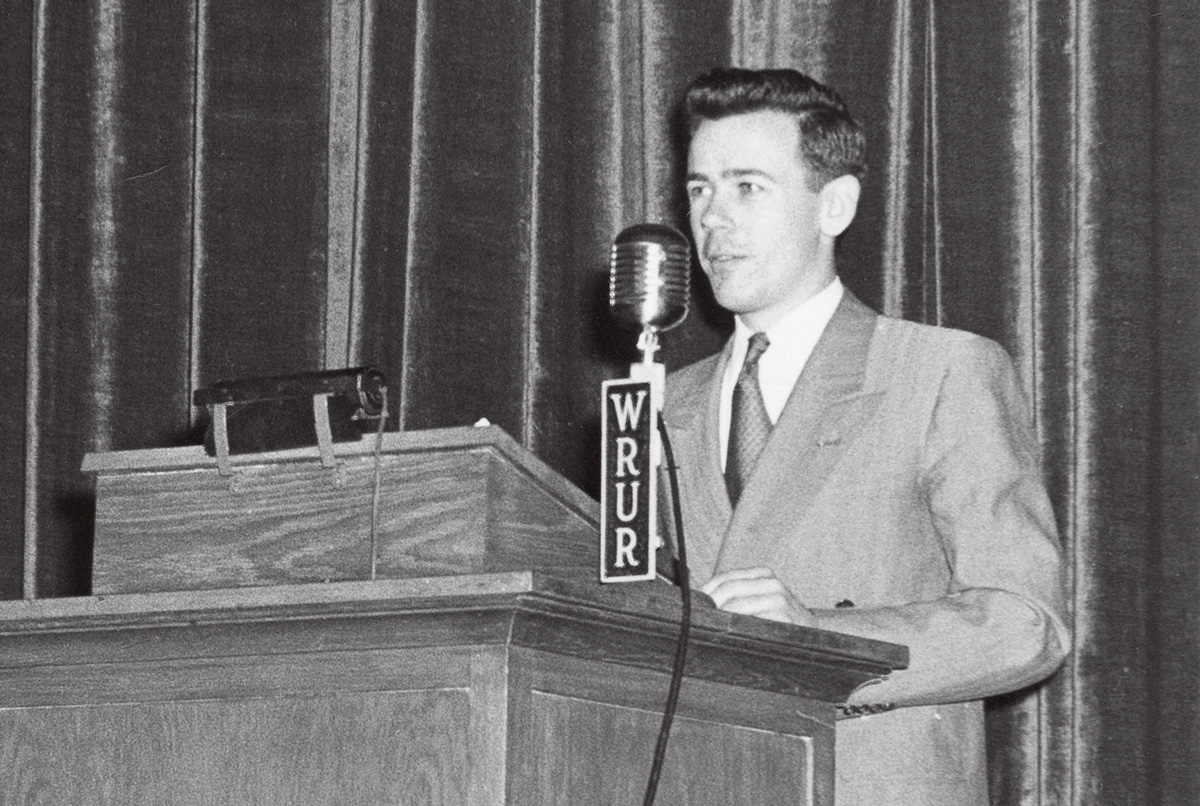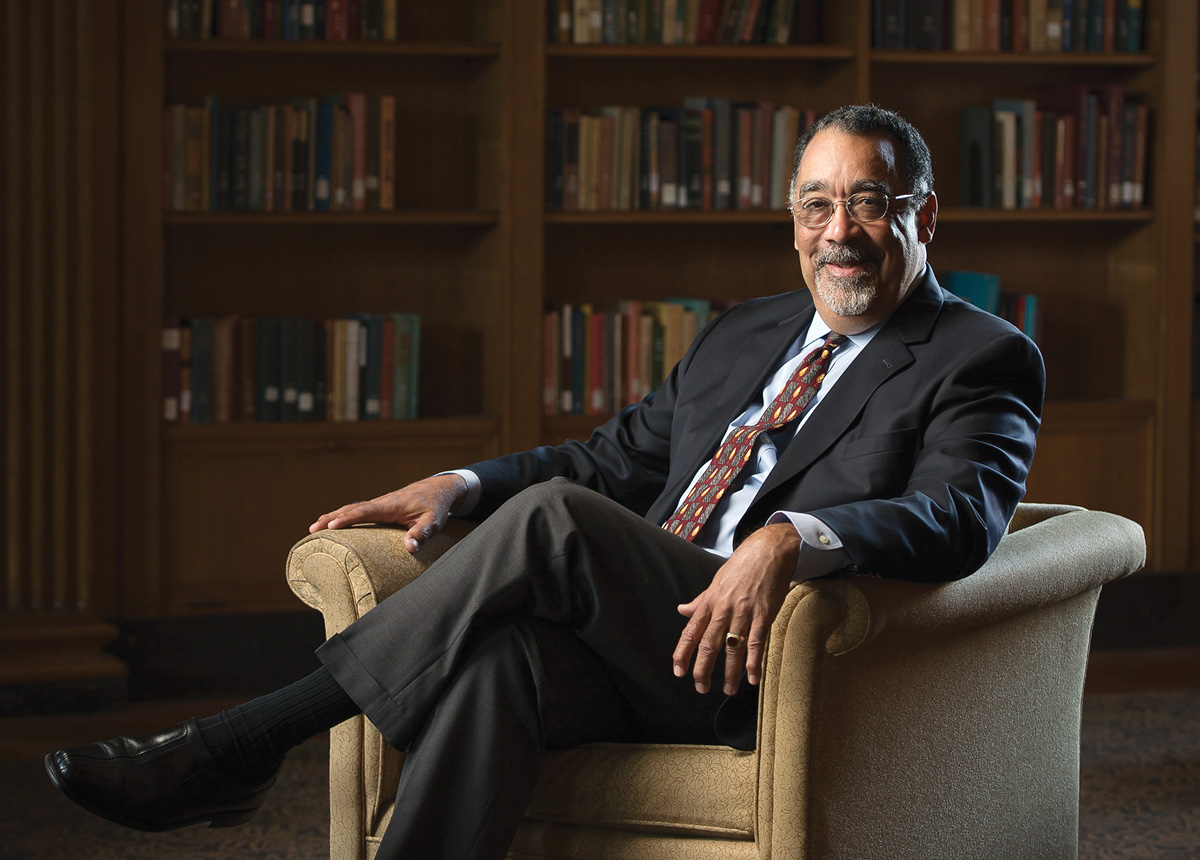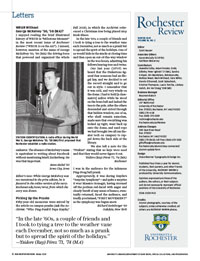Letters
 STATION IDENTIFICATION: A radio officer during World War II, George McKelvey ’50, ’58 (MA) first proposed that Rochester establish a radio station. (Photo: University Libraries/Department of Rare Books, Special Collections, and Preservation)
STATION IDENTIFICATION: A radio officer during World War II, George McKelvey ’50, ’58 (MA) first proposed that Rochester establish a radio station. (Photo: University Libraries/Department of Rare Books, Special Collections, and Preservation)I enjoyed reading the brief illustrated history of WRUR in “Milestone Moment” in the fall issue of Rochester Review (“WRUR Is on the Air”).
I missed, however, mention of the name of George McKelvey ’50, ’58 (MA), the driving force that powered and organized the whole endeavor.
The absence of McKelvey’s name is equivalent to writing about Facebook without mentioning Mark Zuckerberg. He was that important.
Kenn Hubel ’50
Iowa City, Iowa
Editor’s note: While George McKelvey was not mentioned in the print edition, he is featured in the online version of the story, Rochester.edu/news/wrur, from which the brief history was drawn.
Picking Up the Pranks
Fifty-year-old memories were stirred by the article on campus pranks (Ask the Archivist: “Who Ping-Punk’d Papa Haydn,” Fall 2018), in which the Archivist referenced a Christmas tree being placed atop Rush Rhees.
In the late ’60s, a couple of friends and I took to tying a tree to the weather vane, not so much as a prank but to spread the spirit of the holidays.
One of us would hide in the stacks at closing time and then open [a no longer extant] window in the wee hours, admitting his fellows bearing tree and twine.
We heard that the Pinkertons figured that someone had an illegal key, and we decided to set the record straight and go out in style.
I remember that it was cold and very windy. I had to hold [a classmate’s] ankles while he lashed the tree to the pole. After the others descended and exited through the window, one of us, who shall remain nameless, made sure that everything was locked up tight.
We also left a note for the “Pinkies” stating that no keys were used and that they would never figure it out.
Ysidore (Ray) Pérez ’71, ’74 (MA)
Rochester
The Brother of a Nobel Laureate
I appreciate your sending me Review all these years. I enjoy reading about the progress made and the students developing their lives. I have very happy memories of my years in Rochester—long ago—when I did my graduate studies in biology and met my late husband, Julius Ashkin. He was an assistant professor of physics from 1946 to 1950.
I feel impelled to write because there is a misspelling of the name in the article about [Nobel laureate] Donna Strickland ’89 (PhD) (“Love at First Light,” Fall 2018). It’s Arthur Ashkin (with no “d”), Julius’s brother, who was the other laureate in physics last year.
Claire Ashkin ’47 (MS)
Reno, Nevada
Editor’s note: We apologize to the Ashkin family for our error.
 ‘FRIEND AND HERO’: “I will forever be sharing his insights with others,” says Joel Helfrich of Paul Burgett, who, in his many roles at Rochester, was always a source of caring and wise counsel. (Photo: J. Adam Fenster)
‘FRIEND AND HERO’: “I will forever be sharing his insights with others,” says Joel Helfrich of Paul Burgett, who, in his many roles at Rochester, was always a source of caring and wise counsel. (Photo: J. Adam Fenster)Remembering and Celebrating Paul Burgett ’68E, ’76E (PhD)
The late Māori writer and activist Bruce Stewart once said, “we need heroes who leave threads for the rest of us to follow.” Paul Burgett ’68E, ’76E (PhD), the longtime, deep-rooted University vice president who passed away in 2018 (“Part of Something Better,” Fall 2018), was such a hero who left behind a number of prescient threads for all of us, especially me, to follow.
I am fortunate to have known Paul for 24 years, exactly the last third of his life. During that time, he was my advisor, mentor, teacher, confidant, and, most significantly, friend—and often all at the same time. For nearly the entire time I have known him, I (like many other graduates) referred to him as Dean Burgett, as a reference to the first time that I met him in his role as the dean of students at Rochester. His office was on the top floor of Wilson Commons. When I sought him out, I was an untethered first-year undergraduate in need of guidance.
Like Paul, I was what he would call a “Regional Treasure.” I had grown up playing soccer in the suburbs of Rochester. I was, as he put it, a “big fish in a small pond” who, after arriving at Rochester, became a “small fish in a big[ger] pond.” It was not a put-down. Rather, his comments were a statement of fact. Ultimately, Paul helped me to become comfortable with the idea that I often exist on the “margins,” which he noted is an exciting place to be.
For me, and perhaps thousands of other students, Paul was most successful at explaining what college is for. A skilled orator, Paul gave a number of public lectures that the University thankfully recorded. I have for many years of teaching at Monroe Community College and elsewhere used a 2013 YouTube recording of Paul’s talk regarding the “The Fiery Furnace,” a presentation he had given in various forms for decades. Through Paul’s words, students in the college orientation classes I teach have grappled with the following concepts: that higher education is about the “confrontation with ideas” and the “production of knowledge.”
The news of his passing was a punch in the gut. Through my tears, I turned to advice he has shared over the years: “Seek out satisfaction in life, rather than happiness. No one can be happy all of the time; indeed, life never affords anyone that luxury. Satisfaction, on the other hand, is the real barometer of your quality of life; it is having enough. To leave the dinner table full, but not painfully so.” His words have offered me some level of solace.
He regularly pushed back against the idea that happiness is the goal in life. Stated Paul, “Life is too complex to reduce its objective to something like happiness. Because life has pain, it has sorrow, it has disappointment, it has failure, and none of us is immune to any of those things. Happiness is like a butterfly. A butterfly flutters around me and occasionally will treat me by landing on my shoulder, but I can’t own it. Happiness, whatever that word means, is not a constant.” I will forever be sharing his insights with others.
At the end of the day, Paul was one of the few people who actually knew and “got” me. He listened actively to me. He always made me feel as if he was genuinely interested in me. I believe he was, as I was in him. I will miss his booming voice, his kind embrace, his unyielding curiosity, and his friendship. I will miss him sharing his passions and compassion with me.
I hope to be a sliver of the person—the compassionate, imaginative, inventive, and inspirational person—that he was; continue to show others the influence he has had on me; and pick up, share, and lengthen the threads that Paul Burgett—Dean Burgett—left for all of us.
Joel Helfrich ’98
Rochester
This letter is adapted from a longer essay. To read that version, as well as other tributes to Burgett, visit Rochester.edu/news/remembering-paul-burgett.
Review welcomes letters and will print them as space permits. Letters may be edited for brevity and clarity. Unsigned letters cannot be used. Send letters to Rochester Review, 22 Wallis Hall, Box 270044, University of Rochester, Rochester, NY 14627-0044; rochrev@rochester.edu.

